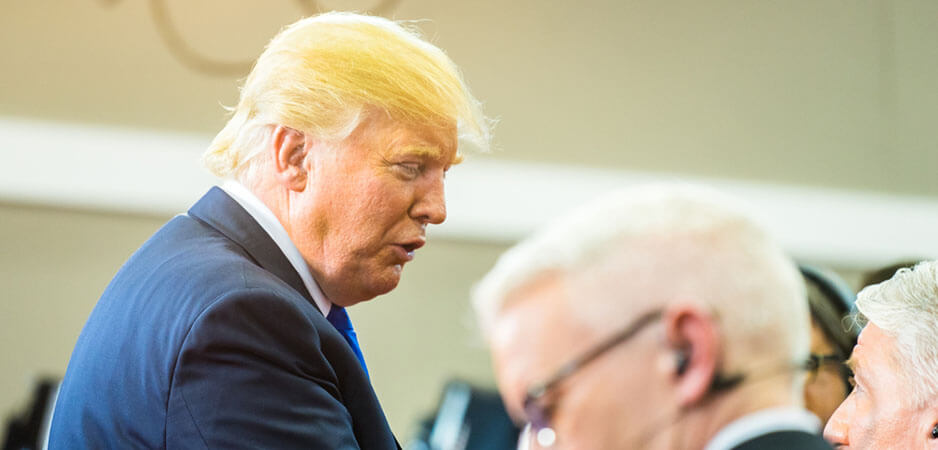US President Donald Trump has sent a letter of “respect” to African nations following his alleged “shithole countries” comment.
After famously referring to African countries along with Haiti as “shithole countries,” Donald Trump insisted on setting the record straight in a letter addressed to the 55 members of the African Union about his true sentiments. We thus learn that he “deeply respects” Africans.
Here is what he wrote: “I want to underscore that the United States deeply respects the people of Africa, and my commitment to strong and respectful relationships with African nations as sovereign nations is firm.”
Here is today’s 3D definition:
Respect:
A performative verb intended to reassure another person that, because you are hoping for an advantage from your relationship with that person, you will not act in accordance with your true sentiments
Contextual note
The importance of promising respect generally follows the suspicion that respect is precisely what is lacking. Stanley Kubrick provided a perfect example of this use in a tense scene from Dr Strangelove. During the nuclear crisis meeting in the War Room, when the bellicose General Buck Turgidson receives a phone call from his young mistress who feels neglected, he whispers into the telephone attempting to appease her by saying how deeply he respects her. Here is the dialogue from the screenplay:
“TURGIDSON: (on the phone) Well look, baby, I can’t talk to you now. My president needs me. Of course Bucky would rather be there with you. Of course it isn’t only physical. I deeply respect you as a human being. Someday I’m gonna make you Mrs. Buck Turgidson.”
Here is the entire scene (the phone call with his mistress starts at 6:21).
Historical note
That the phrase “I deeply respect” tends to be used in tense situations, where even “deeper” criticism is implied is borne out in this remark by Jean-Claude Juncker concerning British Prime Minister Theresa May: “I deeply respect the British Prime Minister, I like her as a person, I’ve noted she’s a tough lady.”
In the case of Trump, it sounds more like an insincere apology that his African interlocutors, such as Rwandan President Paul Kagame, have been forced to accept because it would be dangerous to provoke the US.
Are African leaders satisfied with his declaration of deep respect? With possibly one exception, they seemed to feel it did not erase the insult. For example, Ghanaian President Nana Akufo-Addo tweeted “We will not accept such insults, even from a leader of a friendly country, no matter how powerful.” African pride does exist.
On the other hand, one leader expressed his admiration for Trump’s candid denigration of African nations. “Ugandan president Yoweri Museveni backed President Donald Trump’s alleged comments about ‘shithole countries,’ praising him for talking about ‘Africans’ weaknesses frankly.’” Jessie Duarte, the deputy secretary general of South Africa’s African National Congress, expressed the dominant view: “Ours is not a shithole country and neither is Haiti or any other country in distress.” And Botswana’s Foreign Ministry called Trump’s comment “highly irresponsible, reprehensible and racist.”
 Museveni is a special case. According to the BBC, when Museveni recently told the East African Legislative Assembly (EALA) that “America has got one of the best presidents ever,” his words were greeted with laughter. Museveni has other reasons to admire Trump. As the Simmons Voice reminds us: “Museveni has been the president of Uganda for over three decades. He has a history of amending the constitution to allow himself to run for more terms.” Many are wondering if Trump wouldn’t like to emulate Museveni.
Museveni is a special case. According to the BBC, when Museveni recently told the East African Legislative Assembly (EALA) that “America has got one of the best presidents ever,” his words were greeted with laughter. Museveni has other reasons to admire Trump. As the Simmons Voice reminds us: “Museveni has been the president of Uganda for over three decades. He has a history of amending the constitution to allow himself to run for more terms.” Many are wondering if Trump wouldn’t like to emulate Museveni.
Finally, it should be noticed that Trump was quoted using the term “shithole countries,” but directed his respect to “the African people,” which could technically be interpreted as non-contradictory insofar as he considers the national governments and not the people responsible for the shitholes. Going back to the year when Dr Strangelove was made, 1963, this may remind us of the traditional defense offered by whites accused of racism and of none other than Governor George Wallace, who claimed he couldn’t be a racist because ”some of my best friends are Negroes.”
*[In the age of Oscar Wilde and Mark Twain, another American wit, the journalist Ambrose Bierce, produced a series of satirical definitions of commonly used terms, throwing light on their hidden meanings in real discourse. Bierce eventually collected and published them as a book, The Devil’s Dictionary, in 1911. We have shamelessly appropriated his title in the interest of continuing his wholesome pedagogical effort to enlighten generations of readers of the news.]
The views expressed in this article are the author’s own and do not necessarily reflect Fair Observer’s editorial policy.
Photo Credit: stock_photo_world / Shutterstock.com
Support Fair Observer
We rely on your support for our independence, diversity and quality.
For more than 10 years, Fair Observer has been free, fair and independent. No billionaire owns us, no advertisers control us. We are a reader-supported nonprofit. Unlike many other publications, we keep our content free for readers regardless of where they live or whether they can afford to pay. We have no paywalls and no ads.
In the post-truth era of fake news, echo chambers and filter bubbles, we publish a plurality of perspectives from around the world. Anyone can publish with us, but everyone goes through a rigorous editorial process. So, you get fact-checked, well-reasoned content instead of noise.
We publish 2,500+ voices from 90+ countries. We also conduct education and training programs
on subjects ranging from digital media and journalism to writing and critical thinking. This
doesn’t come cheap. Servers, editors, trainers and web developers cost
money.
Please consider supporting us on a regular basis as a recurring donor or a
sustaining member.
Will you support FO’s journalism?
We rely on your support for our independence, diversity and quality.






